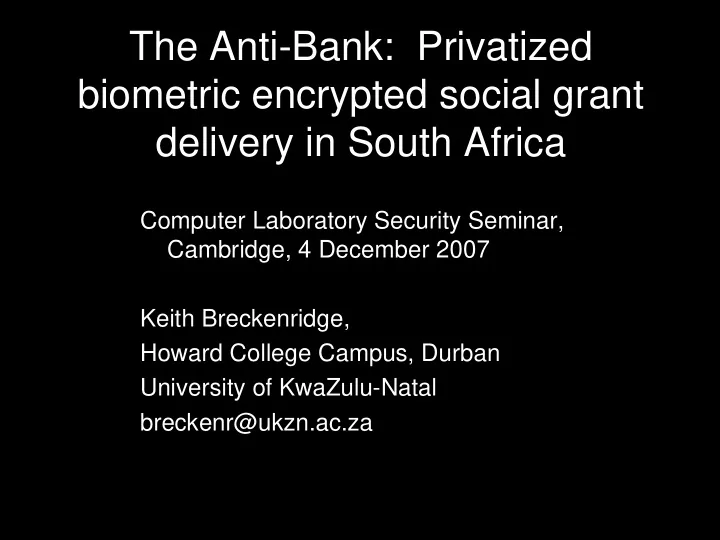

The Anti-Bank: Privatized biometric encrypted social grant delivery in South Africa Computer Laboratory Security Seminar, Cambridge, 4 December 2007 Keith Breckenridge, Howard College Campus, Durban University of KwaZulu-Natal breckenr@ukzn.ac.za
The difficulties of real bureaucracy
Pensions, Child Support, Disability (HIV, TB), 13 million people
Crowds
Home Affairs: Problem No 1
No 2 Capturing Good Data
No 3 In a society organized around fingerprint registries
No 4
Biometric Registration Automated Paperless Privatized Delinguistic
Registering Users
Capturing Templates
Ten templates
Pensioners’ Committees
Private Security
Automating payments Card to Card
Morpho-touch Sagem’s
fingerprinting, no enrolment Attended problems
No talking
Fingerprint-based grants, no pin codes or passwords
Smartcard equipped ATMs
the Money recipient Only the handles
Banking the unbanked
Funeral Plans
without risk Lending
Aplitec-owned microlending
Selling on Commission, Explaining automatic deductions
The heart of the new welfare supported informal economy : Umlazi
Aplitec’s solution
Who is Aplitec? People • Serge Belamont, – developed and managed the SASwitch interbank system, 1983 – 1987 – Third largest bank switch in the bank in the world – Entrenched conflicts over standards, mostly against IBM clients • Also Hanoch Neishlos, Wits Computer Science …
Who is Aplitec? Investors • Initially, in 1997, Cosatu’s Kopana ke Matla trust • Nedbank (28%), sold in 2007 • Serge Belamont & other staff own 12% • Doing an “Aplitec” – Nasdaq relisting in 2005, market cap increased 15 fold, from $100 million to $1.5 billion • Obscure South African investors – Trust in the Cayman Islands
Aplitec divisions • May 1998, Net1, Nedbank’s supplier of smartcard and pos equipment • March 1999, Cash Payment Services, FNB owned biometric pensions delivery scheme • 1999 & 2000, two large microlenders – Moved their clients to smartcards • 2006 Prism & Easypay, largest online SET – 200 municipalities, utilities, traffic departments – Retail interbank • 2007 merger with Grindrod Bank – Smartcard wages and banking
Aplitec Projects • Taxi Recapitalization 1999 – Using smartcards to control overloading, routes, ‘corruption’ – Ended in violence • Massive expansion of grants in 2002 – 3, from 2.5 million to 13 million recipients • African bank switching (Ghana, Nigeria, Malawi, Botswana, Namibia) and UEPS
Aplitec Infrastructure • Biometrically-encrypted smart cards – We are talking people that are not going to remember the pin number on the card. I cannot remember my pin number on my card. So we have a system here, which is completely based and it has been based for the last ten years on fingerprint technology. We do not use pins at all. There are no pins … – Encrypted and unencrypted wallets • 4000 Smartcard equipped POS Devices – Mostly in the countryside – 2005 $ 133 million, 2006 $ 614 million – 850,000 clients using the POS to draw grants • 8000 mobile and fixed payment points • Easypay
Aplitec and the EMV Std • Big four interest in a ‘common standard’ • Belamont – EMV is the poor paying for the rich – “There is no fingerprint technology on Visa and MasterCard. It does not work offline. It cannot do money transfers. It is expensive. And therefore we cannot use this technology and therefore we removed it but somebody had managed to put Visa/MasterCard, which is a proprietary money making organisation world wide, as a normal standard for the country. • Aplitec’s deliberatly proprietary standard – The UEPS is proprietary. It is designed for a specific market that requires specific features and as such is not compliant or compatible with other smart card systems. If it were compatible with other systems, the usefulness of the UEPS would be as limited as these other systems and could not provide a solution for the unbanked populations of the world. • Dual System & Morphing …
Politics • Relationships with Government – Politics of “Joint Venture” in South Africa and beyond • Prince Gideon Zulu in KZN • Sandi Majali’s Permit Group – Also Accountability • Skweyiya’s fury in 2000 over the death of four pensioners in queues • Foresight on the HANIS debacle – July 2000 : “Government will separate the payment application from the ID card and leave the payment card to the financial industry “
Recommend
More recommend